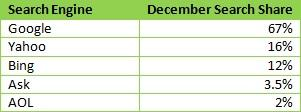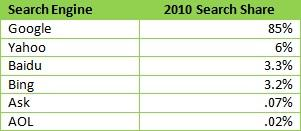
The Next Big Search Engine

For a long time, Google has been the undisputed heavyweight in search. Ever since it was first launched more than ten years ago, it has won over fans with its simple interface and focus of returning the most relevant results in the quickest time. Google has definitely helped the Internet’s association with the fast, almost instant, availability of information.
When Google first launched, there were a number of competitors vying for the lion’s share of online search – Yahoo, AOL, MSN, Ask, Alta Vista, Lycos and many more. Google seemed to arrive and blow everyone else out of the water and show no signs of slowing. It’s now almost impossible to imagine using the Internet without Google – it ranks as the number one website for many countries according to Alexa. Its market share of search is as much as 85% globally and it continues to provide new services such as Maps, Places, Gmail and Docs. Google has now even become immortalised in the English language with the verb ‘to google’.
What happened to the other search engines then? Yahoo continues to be a key player in the US especially. However, its usage seems to be slowly losing ground to competitors. Microsoft’s newly re-launched search service, Bing, is expected to leapfrog Yahoo in the next 12 months to be the second largest search engine. Check below to see a table showing the top search engines in the US for December 2010 (according to comScore):
 As you can see, Google totally dominates the US search market. But what about globally? Based on Net Market Share data for 2010, we can see that Google performs even better worldwide than in the US:
As you can see, Google totally dominates the US search market. But what about globally? Based on Net Market Share data for 2010, we can see that Google performs even better worldwide than in the US:
 Google has an unprecedented market share – no other search engine even comes close! Interestingly, you can see that Chinese search engine Baidu ranks at number three. This is an amazing achievement considering the narrow demographic it caters to (bearing in mind Baidu is largely only used in China whilst Google is global).
What next for the online search industry? Well, it is hard to imagine any other search engine being able to dislodge Google’s strong hold but let’s look at some hypothetical contenders:
Google has an unprecedented market share – no other search engine even comes close! Interestingly, you can see that Chinese search engine Baidu ranks at number three. This is an amazing achievement considering the narrow demographic it caters to (bearing in mind Baidu is largely only used in China whilst Google is global).
What next for the online search industry? Well, it is hard to imagine any other search engine being able to dislodge Google’s strong hold but let’s look at some hypothetical contenders:
 As you can see, Google totally dominates the US search market. But what about globally? Based on Net Market Share data for 2010, we can see that Google performs even better worldwide than in the US:
As you can see, Google totally dominates the US search market. But what about globally? Based on Net Market Share data for 2010, we can see that Google performs even better worldwide than in the US:
 Google has an unprecedented market share – no other search engine even comes close! Interestingly, you can see that Chinese search engine Baidu ranks at number three. This is an amazing achievement considering the narrow demographic it caters to (bearing in mind Baidu is largely only used in China whilst Google is global).
What next for the online search industry? Well, it is hard to imagine any other search engine being able to dislodge Google’s strong hold but let’s look at some hypothetical contenders:
Google has an unprecedented market share – no other search engine even comes close! Interestingly, you can see that Chinese search engine Baidu ranks at number three. This is an amazing achievement considering the narrow demographic it caters to (bearing in mind Baidu is largely only used in China whilst Google is global).
What next for the online search industry? Well, it is hard to imagine any other search engine being able to dislodge Google’s strong hold but let’s look at some hypothetical contenders:
- BingYes, Bing! Although probably not going to beat Google, many people forecast it to become the second most used search engine soon. Coupled with the merger with Yahoo and it is easy to see how Bing will become more of a competitor for Google.
- BaiduBaidu is arguably the most significant contender to Google. Whilst it may only reign supreme in China, China’s population is expected to grow and its economy recently dislodged Japan as the world’s second largest – arguably whoever can crack the Chinese Internet market is in for a good future. What will be key though is if Baidu can branch out to other geographies. Interestingly, its ranking in other neighbouring areas is less significant. According to Alexa it is the 7th most popular in Hong Kong whilst only being 9th in South Korea and 15th in Taiwan. Baidu’s growth overseas will be the most important factor in determining whether it will be a genuine competitor to Google or not.
- YouTubeYes, I know it is not technically a search engine but you do search on it! Interestingly, YouTube recently become the second largest search engine in terms of monthly searches performed. This represents a huge shift in the way people are searching for information. As broadband becomes the norm and advertisers continue to embrace online media, media-rich content is becoming standard. YouTube (which Google owns) highlights two things about the Internet. Firstly, Internet users enjoy communicating and secondly, text is no longer enough. Neither is animated gifs. For SEOs, web marketers and anyone associated with the web world – ignoring the power of YouTube and multi-media search may prove to be a mistake.
- FacebookLast but not least, a small website you might not have heard of yet. Facebook’s growth has been unparalleled – adding hundreds of thousands of users daily. At the moment, Facebook is still very much centred around users and people. You can’t search for information in the same way but more and more information is getting uploaded to Facebook pages for people to ‘like’.Additionally, Facebook gives companies and individuals the ability to speak directly to visitors in a way that is not often afforded to them on websites and traditional media.
So there we have it! Google is probably going to continue to be the undisputed search behemoth but there are numerous contenders vying for second place. What will be most interesting is to see how traditional search engine alternatives develop.
As Facebook gears up to launch its new communication platform (including emails), does this signify Facebook’s intent to become the new Google? We will have to wait and see!
This is what our SEO consultancy London team thinks, but what are your predictions for the online search industry?
